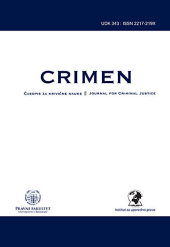PRAVO NA OBRAZLOŽENU SUDSKU ODLUKU
RIGHT TO A REASONED COURT DECISION
Author(s): Goran P. IlićSubject(s): Constitutional Law, Criminal Law, Human Rights and Humanitarian Law
Published by: Правни факултет Универзитета у Београду
Keywords: reasoning; court decision; right to a fair trial; grave violation of criminal procedure rules; facts; court practice;
Summary/Abstract: In addition to expressly stipulated guarantees of fair proceedings, the right to a fair trial also contains implicit guarantees which were developed through the practice of the European Court of Human Rights. Guided by the idea of the rule of law which has a specific meaning in the field of procedural law, the Court in Strasbourg set forth as an integral part of the right to a fair trial also the right to a reasoned court decision. The paper first points to the theoretical justification of this right, and proceeds to analyzing its existence in comparative law. Standards relating to the right to a reasoned decision developed through case-law of the European Court of Human Rights are presented in detail, covering also positions taken by Strasbourg institutions regarding decisions rendered by juries and the fact that they do not contain reasoning. The paper then proceeds to analyze provisions of the 2001 Criminal Procedure Code which pertain to shortcomings in the reasoning of a judgment as a basis for lodging an appeal. In relation to that, the paper analyses domestic case-law in the period from 1994 to 1998 and points to the fact that shortcomings in the reasoning has been the basis relied on most frequently by the appellate court when annulling the first instance judgment. A critique of theoretical positions and court practice whereby certain shortcomings in the reasoning in essence represent a basis for review of factual accuracy of a judgment is also provided. A review of solutions contained in the 2011 Criminal Procedure Code and changes to the rules regarding shortcomings of the reasoning as a basis for lodging an appeal is also provided. The paper also analyses new legislative solutions which provide a possibility for a judgment not to contain reasoning, under specific circumstances, or for it to be partial. Lastly, but in no way of less significance, the paper also considers jurisprudence of the Constitutional Court of Serbia and positions it has taken regarding the right to a reasoned decision.
Journal: CRIMEN - časopis za krivične nauke
- Issue Year: 2011
- Issue No: 2
- Page Range: 227-244
- Page Count: 18
- Language: Serbian

